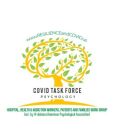Coronavirus Disease 2019
Self-Compassion and Kindness During COVID-19
Using our values as a spiritual compass for healing.
Posted February 26, 2021
This post was written by Dr. Robert M. Gordon, Usha Persaud, M.S., and Sara Schapiro, M.S. Dr. Gordon is a member of the COVID Psychology Task Force (est. by 14 divisions of the American Psychological Association) working group: Hospital, Healthcare, and Addiction Workers, Patients and Families that sponsors this blog.
COVID-19 has been a sudden, unexpected, and existential challenge for many, provoking uncertainty of our safety in the world (Hoffman, 2021).
We are all struggling with the dilemma of taking care of others when we need to take care of ourselves. Just as on an airplane, where parents are urged in case of an emergency to put on their own oxygen masks before their child’s, we are also faced with the challenge of prioritizing our compassion for ourselves and kindness to others.
The humanistic values of self-compassion and kindness are potential healing factors in navigating the uncertain and turbulent waters of the pandemic.

Self-Compassion
Self-compassion means “treating oneself with kindness, care, and concern in the face of negative life events” (Terry & Leary, 2011, p. 352). In a similar way that we would provide care for and kindness toward a good friend during a difficult time, self-compassion entails directing that same kindness toward ourselves when facing mistakes, failures, and obstacles.
Self-compassion includes three components: self-kindness, common humanity, and mindfulness (Neff, 2003; Germer & Neff, 2013).
Self-kindness means being supportive and understanding of oneself during a difficult time, rather than being harshly self-critical (Neff, 2003).
Common humanity involves seeing our imperfections and struggles as part of the human condition rather than as an isolated experience. Thus, we are not alone in our suffering, imperfections, or failures. Everyone in the world shares these experiences and recognizing this fact allows us to be more empathic and less isolated and alone.
Mindfulness involves recognizing when we are stressed or having a difficult time and becoming aware of this without judgment or avoidance. Being mindful allows us to appreciate a broader view of life and reflect on the present moment with perspective, rather than spending time and energy worrying about past or future concerns. In order to cultivate self-compassion, it is necessary to be mindful of our stress and struggles so we recognize the need to comfort ourselves (Germer & Neff, 2011). This means acknowledging our shortcomings rather than suppressing, obsessing, exaggerating, or ruminating, or over-identifying with one’s situation (Neff, 2011).
Self-kindness rather than self-judgment; common humanity rather than self-deprecation; and mindfulness rather than suppression or avoidance, form the dimensions of self-compassion (Neff, 2003; Umphrey & Sherblom, 2014).
Within the context of COVID-19, research indicates that self-compassion acts as a protective factor from the negative mental health impacts of the pandemic and enhances resilience (Lau et al., 2020).
Examples of How to Be Self-Compassionate During COVID-19
- Consider what you might tell a good friend who is feeling distressed or isolated and direct that same warmth, kindness, and support toward yourself.
- Remember that your imperfections and struggles are shared by others all over the world.
- Engage in activities that foster mindfulness to connect with yourself (e.g., meditation, deep breathing, creating art, and enjoying a meal or a walk without distraction).
- Accept rather than avoid your feelings in order to be kind to yourself. When we avoid negative feelings, we are being unkind toward a part of ourselves that is hurting rather than attending and attuning to it.
- Focus on what you can do rather than what you cannot.
- Say aloud positive affirmation when a negative thought emerges:
- I am worthy of compassion.
- I am doing my best and accept myself as I am.
- I deserve to treat myself with kindness.
- I have strengths and weaknesses like any human being, and that is okay.
Kindness
An equally important and related concept to compassion is kindness toward others. Kindness is defined as the quality of being friendly and considerate and requires courage and strength (Hall, 2017).
When individuals reflect back on their lives, they often remember simple acts of kindness from teachers, friends, family, and neighbors such as a reassuring look or comment, a quote, a letter, or a visit to the hospital. Frequently, these simple acts of kindness have greater impact years after they occur. These acts are like a lighthouse in the water, illuminating that kindness is at the heart of all human relationships (Buechler, 2004). Being kind to another person conveys that they matter; to matter and to be noticed is at the core of the human condition. Moreover, both the giver and the receiver experience the benefits of kindness.
The pandemic has shown us how easy it is to remain connected through virtual mediums yet at times feel so disconnected. As people, we need touch, spontaneous personal encounters, or a smile from a colleague. How does kindness get expressed during a time where contact is limited and our smiles are covered by masks? It requires that we set an intention and commit to participating in acts of kindness. A kind act should include taking time to go out of your way, doing something unexpected for another person, and showing someone that you are thinking of them.
Kindness includes emotional, behavioral, and intentional components (Binfet, 2015). Kindness does not have to be extensive or elaborate, it merely needs to be an action that is thoughtful and intentional.
Possible Acts of Kindness During the Pandemic
- Make an unexpected phone call to a loved one, friend, colleague, or neighbor.
- Have the willingness to listen generously and to care about what others are saying (Remen, 2000).
- Provide service to those who are most vulnerable.
- Volunteer.
- Purchase a coffee for the person in line behind you.
- Check on a neighbor who lives alone (Remen, 2020).
- Compliment a stranger or a friend.
- Cook a nice dinner for the people in your household.
Concluding Thoughts
As we navigate the unchartered waters of the pandemic, it is important to realize that “modest acts of kindness are more significant than we recognize…[we] just need to touch one person each day with compassion” (Burger, 2018, p. 176). Compassion begins with the acceptance of what is most human in ourselves, including our shared vulnerability and our collective loss during the pandemic (Remen, 2000).

Robert M. Gordon, Psy.D. is the Director of Intern Training and Associate Director of Postdoctoral Fellow Training at Rusk Rehabilitation and Clinical Associate Professor at NYU Grossman School of Medicine. He received his doctorate from Ferkauf Graduate School of Psychology. Dr. Gordon has specialties in the areas of neuropsychological and forensic testing and psychotherapy with children and adults with physical and learning disabilities and chronic illness. He has published in the areas of ethics, supervision, existential-humanistic and relational approaches during COVID-19, dream interpretation, pain management, and the use of projective testing in neuropsychology.

Usha Persaud, MS is a Psychology Intern at NYU Rusk Rehabilitation. She is currently
completing her doctorate of psychology at Fairleigh Dickinson University. Her research
interests involve investigating the behavioral and neuropsychological underpinnings of decision-making, stress, and coping within clinical populations.
Sara Schapiro, MS is a Mental Health Counselor and a Psychology Intern at NYU Rusk Rehabilitation. She is currently completing her doctorate of psychology at Adelphi University. Ms. Schapiro is trained in the areas of gender-affirming therapy, religion and sexual health, neuropsychological testing, and rehabilitation. She has published in the areas of masculinity, sexual behaviors, and personality disorders.
References
Binfet, J. T. (2015). Not-so random acts of kindness: A guide to intentional kindness in the classroom. International Journal of Emotional Education, 7(2), 49-62.
Buechler, S. (2004). Clinical values: Emotions that guide psychoanalytic treatment. The Analytic Press.
Burger, A. (2018). Witness: Lessons from Elie Wiesel’s classroom. Houghton Mifflin Harcourt.
Germer, C. K. & Neff (2013). Self-compassion in clinical practice. Journal of Clinical Psychology, 69(8), 856-867.
Hall, K. (2017, December 4). The importance of kindness. Psychology Today. December 4, 2017. http:/www.psychologytoday.com/us/blog/pieces-mind/201712/the-importance-Kindness
Hoffman. L. (2021). Existential-Humanistic therapy and disaster response: Lessons from the COVID-19 Pandemic. Journal of Humanistic Psychology, 61, 33-54. http://doi.org/10.1177/0022167820931987
Lau, B. H. P., Chan, C. L. W., & Ng, S. M. (2020). Self-compassion buffers the adverse mental health impacts of COVID-19 related threats: Results from a cross-sectional survey at the first peak of Hong Kong’s outbreak. Frontiers in Psychiatry, 11, 1203. https//doi.org/10.3389/fpsyt.2020.585270
Neff, K. D., (2003). Self-compassion: An alternative conceptualization of a healthy attitude toward oneself. Self & Identity, 2, 85-101. http://dx.doi.org/10.1080/15298860309032
Neff, K. D. (2011). Self-compassion, self-esteem, and well-being. Social and Personality Psychology, 5(1), 1-12. http://dx.doi.org/10.1111/j.1751-9004.2010.00330.x
Remen, R. N. (2000). My grandfather’s blessings: Stories of strength, refuge, and belonging. Riverhead Books. http://dx.doi.org/10.3389/fpsyg.2020.595806
Terry, M. L., & Leary, M. R. Self-compassion, self-regulation, and health. Self Identity, 10, 352.362. http://doi.org/10.1080/15298868.2011.558404
Umphrey, L. R., & Sherblom, J. C. (2014). The relationship of hope to self-compassion, related. Social skill, communication apprehension, and life satisfaction. Journal of Wellbeing, 4(2), 1-18. http://doi.org/10.5502/ijw.v4i2.1




